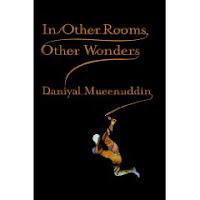
In Other Rooms, Other Wonders
By Daniyal Mueenuddin
Daniyal Mueenuddin is one of the new Pakistani writers-in-English brigade. His first book, a collection of inter-connected short stories, has created quite a bit of buzz in world media. In Other Rooms, Other Wonders has a fresh feel to its voice and its characters prove to be rather arresting.
There is something R.K.Narayan about the whole book – in the rootedness of the milieu, in the ‘almost-effacement’ of the author’s voice, in the ‘letting the story and characters do most of the talking’ type of writing. Of course, the Punjab countryside is redolent of Khushwant Singh in Train to Pakistan and a lot of other Indian books we have read in recent times (Manju Kapur and even Vikram Chandra’s strange partition story in Sacred Games).
In Other Rooms, Other Wonders is a set of 8 stories all set around the large Lahore house and the massive rural farm land of KK Harouni, an old feudal landlord whose lands and wealth are slowly being bled away by corrupt managers. The characters are those of cooks and drivers, managers and butlers, maid servants and electricians; as well as rich socialites who do not think twice about taking a flight to Paris on a whim. It depicts a very feudal society with a wealthy class that is all-powerful and an underclass that is completely dependent on the other – masters and their servants. And even within the underclass there are gradations of power – power that is wielded without compunction to further one’s own cause. What struck me was the complete absence of a middle class, a professional class – lawyers, teachers, doctors, managers. Even when we do encounter them, they are corrupt and completely under the thumb of the wealthy.
The women can go so far and no further. Sex is a weapon they use to get what they want. But even that is possible up to a point. Any further and there is ruin. In the story ‘Saleema’, she is a young maid servant who an older butler Rafiq falls in love with. For a while she is the queen in the servants quarters…yet when Harouni dies, Rafiq is pensioned off and he goes back to his family in his village. Saleema ends up with a child begging on the streets of the city. Similar is the case with Zainab in Provide, Provide. She is the driver’s sister who manages to get into the heart of the all-powerful corrupt manager Jaglani. She manipulates him to give her his son’s child to bring up as hers since she cannot have any of her own. Yet when he lies dying of cancer, her real worth in the scheme of things is brought home to her. His first wife and children are his real heirs and she is left with nothing, not even the child. In the story In Other Rooms, Other Wonders, Husna is the impoverished relative who uses sex with KK Harouni to gain his favour and become part of his glamorous rich world. His daughters ensure she ends up with nothing when he dies. Even in the wealthier class, Sohail Harouni’s (Harouni’s nephew) American middle class girlfriend Helen faces off with her posh future mother-in-law in Paris – and in the end we know she loses. In another story, we find Sohail married to someone called Sonya.
There is a compelling narrative power in each of the stories. All the characters are flawed in a manner that is real, convincing and gripping. There is no winning for almost all. It is a wonderful un-put-down-able book – with an unsullied, refreshing, almost juicy feel to it. I did not want it to end… and that is an unfamiliar feeling in these book-crowded times.
There is something R.K.Narayan about the whole book – in the rootedness of the milieu, in the ‘almost-effacement’ of the author’s voice, in the ‘letting the story and characters do most of the talking’ type of writing. Of course, the Punjab countryside is redolent of Khushwant Singh in Train to Pakistan and a lot of other Indian books we have read in recent times (Manju Kapur and even Vikram Chandra’s strange partition story in Sacred Games).
In Other Rooms, Other Wonders is a set of 8 stories all set around the large Lahore house and the massive rural farm land of KK Harouni, an old feudal landlord whose lands and wealth are slowly being bled away by corrupt managers. The characters are those of cooks and drivers, managers and butlers, maid servants and electricians; as well as rich socialites who do not think twice about taking a flight to Paris on a whim. It depicts a very feudal society with a wealthy class that is all-powerful and an underclass that is completely dependent on the other – masters and their servants. And even within the underclass there are gradations of power – power that is wielded without compunction to further one’s own cause. What struck me was the complete absence of a middle class, a professional class – lawyers, teachers, doctors, managers. Even when we do encounter them, they are corrupt and completely under the thumb of the wealthy.
The women can go so far and no further. Sex is a weapon they use to get what they want. But even that is possible up to a point. Any further and there is ruin. In the story ‘Saleema’, she is a young maid servant who an older butler Rafiq falls in love with. For a while she is the queen in the servants quarters…yet when Harouni dies, Rafiq is pensioned off and he goes back to his family in his village. Saleema ends up with a child begging on the streets of the city. Similar is the case with Zainab in Provide, Provide. She is the driver’s sister who manages to get into the heart of the all-powerful corrupt manager Jaglani. She manipulates him to give her his son’s child to bring up as hers since she cannot have any of her own. Yet when he lies dying of cancer, her real worth in the scheme of things is brought home to her. His first wife and children are his real heirs and she is left with nothing, not even the child. In the story In Other Rooms, Other Wonders, Husna is the impoverished relative who uses sex with KK Harouni to gain his favour and become part of his glamorous rich world. His daughters ensure she ends up with nothing when he dies. Even in the wealthier class, Sohail Harouni’s (Harouni’s nephew) American middle class girlfriend Helen faces off with her posh future mother-in-law in Paris – and in the end we know she loses. In another story, we find Sohail married to someone called Sonya.
There is a compelling narrative power in each of the stories. All the characters are flawed in a manner that is real, convincing and gripping. There is no winning for almost all. It is a wonderful un-put-down-able book – with an unsullied, refreshing, almost juicy feel to it. I did not want it to end… and that is an unfamiliar feeling in these book-crowded times.




No comments:
Post a Comment